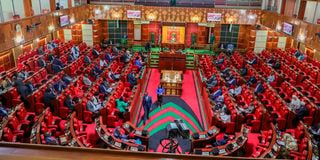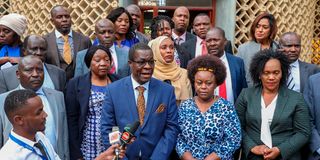Premium
MPs in late-night vote over Finance Bill amendments

Members of the National Assembly during a sitting on June 7, 2023. MPs have proposed further changes to the controversial Finance Bill, 2023 in its Third Reading.
Members of the National Assembly have proposed further changes to the controversial Finance Bill, 2023 in its Third Reading.
At the start of the consideration of the proposed changes to the offending clauses at the Committee of the Whole stage, lawmakers from the Kenya Kwanza Alliance and Azimio la Umoja One Kenya Coalition Party sought to cushion Kenyans from the punitive levies imposed by the government.
A number of amendments have been sponsored by private members, the committee chairs and the House leadership to further amend the Bill, including the adoption of the report by the Finance and National Planning Committee report that was adopted in the Second Reading last week.
The committee, for instance, has proposed further amendments to the Employment Act, 2007 to impose a two per cent penalty on employers who fail to remit workers' contributions to the Housing Development Levy.
The committee had cut by half the three per cent deduction from workers’ salaries proposed by the National Treasury to go towards the National Housing Development Fund and to be matched by employers without the capping of monthly contribution at a maximum of Sh2,500.
Employers will be required to remit to the government an amount comprising the employee and the employer’s contribution not later than nine working days after the end of the month.
“An employer who fails to comply with this section shall be liable to payment of a penalty equivalent to two per cent of the unpaid funds for every month the same remains unpaid,” Mr Kuria Kimani, who chairs the Finance and National Planning committee, said in a further amendment to the Bill.
Monthly levy
The proposals seek to impose a monthly levy payable by employers and employees at 1.5 per cent of the employee’s gross monthly salary. Several opposition MPs have opposed the levy and proposed amendments seeking to either delete the provision or have it established as a voluntary contribution.

National Assembly Finance and National Planning Committee chairperson Kuria Kimani. The committee has made amendments to some of the contested clauses in the Finance Bill 2023.
Saboti MP Caleb Amisi (ODM), James Nyikal (Seme, ODM), Makali Mulu (Kitui Central, Wiper), Antony Olouch (Mathare, ODM), Peter Kaluma (Homa Bay Town, ODM) and Robert Mbui (Kathiani, Wiper) have proposed the deletion of the housing levy from the Finance Bill, 2023.
“That clause 76 of the Bill be deleted,” a document containing the proposed amendments to the Housing Levy states.
Kabuchai MP Majimbo Kalasinga proposed to amend the Housing Levy to make it a voluntary contribution.
He also proposed that, on expiry of seven years or attaining retirement, an employee be entitled to transfer their contributions to a retirement benefits scheme, transfer to their spouse or children or receive the money in cash at the prevailing interest rate.
The levy is intended to finance President William Ruto’s ambitious plan to build 250,000 affordable housing units every year.
The employer and employee’s monthly payment should be remitted not later than nine working days after the end of the month in which the payments are due.
The workers' contributions will not be refundable after the Finance Committee scrapped a clause requiring the State to offer refunds to contributors who miss out on affordable homes after seven years.
Not refundable
None of the existing levies in Kenya are refundable to taxpayers after collection, since they are channelled to a particular use.
They include the Export Levy, the Railway Development Levy, the Road Maintenance Levy and the Anti-Adulteration Levy.
In the initial draft of the Finance Bill, 2023, contributors who missed out on houses were supposed to get their money in seven years with interest.
Mr Kimani also proposed a further amendment to clause 24 of the Income Tax Act on individual rates of tax.
The committee has proposed, for the first Sh288,000 income, a rate of 10 per cent, on the next Sh100,000 (25 per cent), on the next Sh5.6 million(30 per cent), on the next Sh3.6 million (32.5 per cent) and on all income over Sh9 million incurs 35 per cent tax.
The committee had earlier proposed that incomes ranging between Sh500,000 and Sh800,000 be taxed at 32.5 per cent and above Sh800,000 at 35 per cent.
National Assembly Speaker Moses Wetang’ula approved several amendments filed by MPs as factored in the Supplementary Order Paper. Mr Wetang’ula told members that the House Business Committee (HBC) had approved the order of the Finance Bill, 2023 to be considered until Thursday before further directions are issued.
Majority Leader Kimani Ichung’wah moved a procedural motion to extend the sitting time and the consideration of the Bill until its conclusion. He was seconded by Minority Whip Junet Mohammed.

National Assembly Majority Leader Kimani Ichung’wah. Mr Ichung’wah moved a procedural motion to extend the sitting time and the consideration of the Bill until its conclusion. He was seconded by Minority Whip Junet Mohammed.
Earlier, the Speaker addressed himself to the concerns raised by the Rarieda MP Otiende Amollo on the legality of the bill, after it passed the Second Reading before the National Treasury CS Prof Njuguna Ndung’u read the budget highlights last Thursday.
This is a departure from past practice where amendments that touch on money Bills cannot be allowed without the House taking into account the views of the Cabinet Secretary responsible for the National Treasury in line with Article 114 of the Constitution.
“Clause 2, 24, 33,36, 43, 76 and 78 have attracted a lot of amendments. I will allow these amendments. It is not precedent-setting, it’s a unique situation in which I will use my discretion to allow members to prosecute their amendments in the interest of arriving at a consensual outcome of the Finance Bill, 2023,” Mr Wetang’ula ruled. “I have exercised my discretion and magnanimity so that we don’t lock out members unnecessarily. Let them prosecute their amendments and the matter will be decided upon.”
National Assembly input
Leader of minority Opiyo Wandayi (Ugunja, ODM) had proposed that the Sh3.6 trillion budget should be republished.
The submission by Mr Wandayi came after Mr Wetang’ula ruled that some of the proposed amendments were money Bills in nature and, therefore, required the input of the National Assembly before being considered by the House.
“Having applied my mind to various proposed amendments, I have determined that certain amendments are either similar or have been accommodated by those proposed by the committee. Such amendments may be proceeded with if there is concurrence from the National Treasury through the House Committee Finance and National Planning,” said Mr Wetang’ula.
It was at this time that Mr Wandayi demanded that the Bill be withdrawn and republished as the House had until June 30, 2023, to debate on and pass it.

Azimio leaders led by National Assembly Minority leader Opiyo Wandayi during the press conference at Parliament Buildings on June 8, 2023. Mr Wandayi demanded that the Finance Bill, 2023 be withdrawn and republished as the House had until June 30, 2023, to debate on and pass it.
“The House does not require the concurrence of the CS but his views, which can be accepted or rejected. This notion that we are in a hurry to pass this Bill should not be [allowed to prevail]. We have all the time to consider this matter,” said Mr Wandayi.
“Going by the number of amendments proposed, it would appear that the character of this Bill will change in a comprehensive manner, in a manner the public has not rendered their views. An indication that there was no proper public participation and therefore the Bill needs to be republished. The proposed amendments on the Bill should not just be winnowed but the Bill should be republished,” said Mr Wandayi.
However, Mr Ichung’wah faulted Mr Wandayi, noting that, while the House has applied to winnow on some Bills before, such Bills have not been money Bills in nature like the Finance Bill.
“Winnowing has been done on other Bills except for money bills. So it’s not right what the leader of the minority is proposing,” said Mr Ichung’wah adding; “Filibustering is not the first or the last we are seeing in this House.”
“He is saying that we don’t need the concurrence of the CS, which I agree with because we are not under the direction of the CS but there needs to be consultations. This Bill went through the required public participation. The committee devoted a lot of time to this Bill,” Mr Mohamed (Suna East, ODM) dug in.
“The cardinal responsibility of the House is to legislate. We must stop anything that impedes legislation in this House. Members have been told that they needed to consult the National Treasury before proposing amendments to the Bill and that is not right,” Mr Mohamed said.
“This impedes the MPs’ legislative role. Don’t lose what the Constitution has given you. Let there be freedom; such that anyone can bring the amendments they want, put them to the vote and we move forward,” said Mr Mohamed.
Mr Kuria also faulted Mr Wandayi for claiming that the Bill had been processed properly at the public hearing stage even as he vowed that proposed changes by the members had implications on the budget.
“Every clause has a financial implication on the budget. You have already approved the allocation of resources and you cannot amend the financing measures without changing the amount allocated,” the Molo MP said.
Kitui Central MP Makali Mulu also weighed in, saying, all proposed amendments to the Bill are money Bills just like the Bill itself. “All those with amendments should be listened to as opposed to rubbishing their proposals,” said Mr Mulu.
At this point, Mr Wetang’ula acceded to the views of the members and ruled that clauses of the Bill that have attracted a lot of interest be allowed for consideration by the House.
“You will be allowed to prosecute your amendments,” ruled the Speaker as the House made progress on the Bill.






